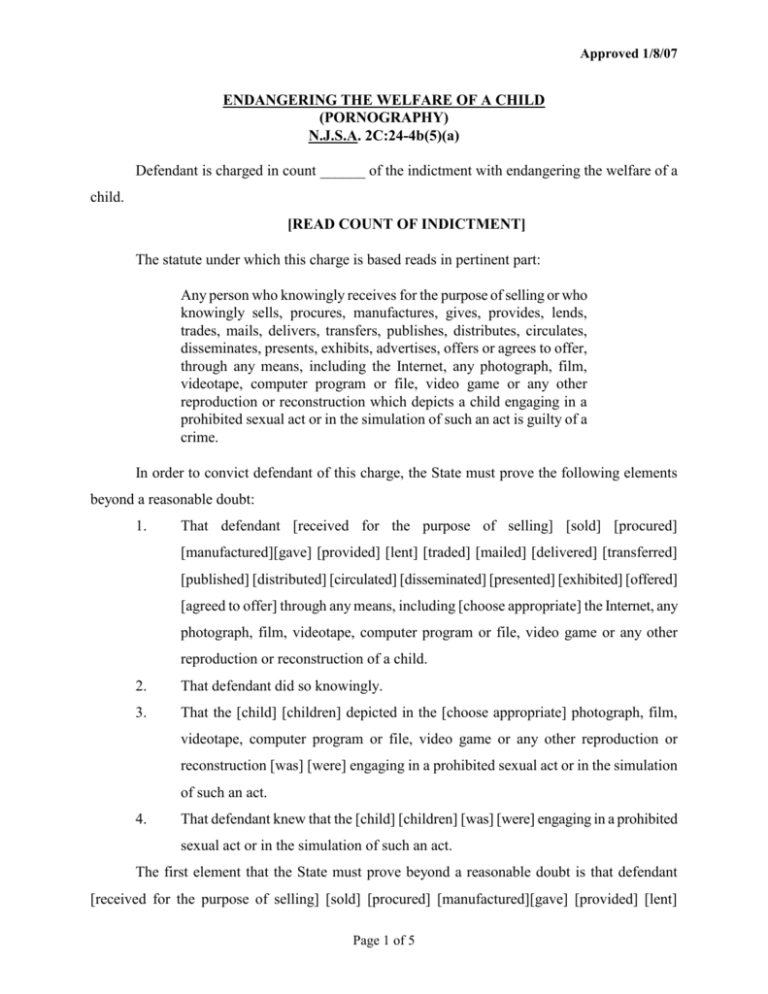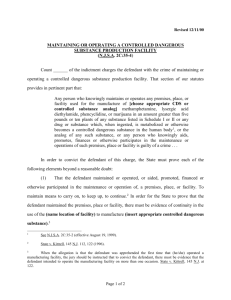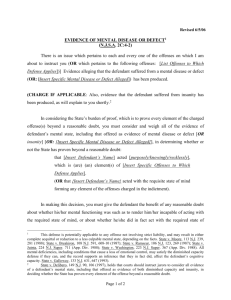
Approved 1/8/07
ENDANGERING THE WELFARE OF A CHILD
(PORNOGRAPHY)
N.J.S.A. 2C:24-4b(5)(a)
Defendant is charged in count ______ of the indictment with endangering the welfare of a
child.
[READ COUNT OF INDICTMENT]
The statute under which this charge is based reads in pertinent part:
Any person who knowingly receives for the purpose of selling or who
knowingly sells, procures, manufactures, gives, provides, lends,
trades, mails, delivers, transfers, publishes, distributes, circulates,
disseminates, presents, exhibits, advertises, offers or agrees to offer,
through any means, including the Internet, any photograph, film,
videotape, computer program or file, video game or any other
reproduction or reconstruction which depicts a child engaging in a
prohibited sexual act or in the simulation of such an act is guilty of a
crime.
In order to convict defendant of this charge, the State must prove the following elements
beyond a reasonable doubt:
1.
That defendant [received for the purpose of selling] [sold] [procured]
[manufactured][gave] [provided] [lent] [traded] [mailed] [delivered] [transferred]
[published] [distributed] [circulated] [disseminated] [presented] [exhibited] [offered]
[agreed to offer] through any means, including [choose appropriate] the Internet, any
photograph, film, videotape, computer program or file, video game or any other
reproduction or reconstruction of a child.
2.
That defendant did so knowingly.
3.
That the [child] [children] depicted in the [choose appropriate] photograph, film,
videotape, computer program or file, video game or any other reproduction or
reconstruction [was] [were] engaging in a prohibited sexual act or in the simulation
of such an act.
4.
That defendant knew that the [child] [children] [was] [were] engaging in a prohibited
sexual act or in the simulation of such an act.
The first element that the State must prove beyond a reasonable doubt is that defendant
[received for the purpose of selling] [sold] [procured] [manufactured][gave] [provided] [lent]
Page 1 of 5
ENDANGERING THE WELFARE
OF A CHILD (PORNOGRAPHY)
N.J.S.A. 2C:24-4b(5)(a)
[traded] [mailed] [delivered] [transferred] [published] [distributed] [circulated] [disseminated]
[presented] [exhibited] [offered] [agreed to offer] through any means, including the Internet, any
photograph, film, videotape, computer program or file, video game or any other reproduction or
reconstruction of a child.
A child means any person under the age of 16 years of age. The State must prove beyond a
reasonable doubt that the child[ren] was [were] under the age of 16 at the time of the offense. It is
not a defense that the defendant did not know that the child[ren] was [were] under the age of 16 or
that the defendant believed that the child[ren] was [were] 16 years old or older, even if such a
mistaken belief was reasonable.1
[USE IF DEFENDANT ASSERTS “VIRTUAL CHILD” DEFENSE]
A child means any person under the age of 16 years of age. The State must prove beyond a
reasonable doubt that the [child][children] [was] [were] under the age of 16 at the time of the
offense. Moreover, the State must prove beyond a reasonable doubt that the images in question were
of [a] real [child] [children] and that defendant knew that the images were of [a] real
[child][children].2
It is not a defense that the defendant did not know that the [child][children] [was] [were]
under the age of 16 or that the defendant believed that the [child][children] [was] [were] 16 years old
or older, even if such a mistaken belief was reasonable.3
Reproduction means, but is not limited to, computer generated images.
[EXCEPT WHEN THE ALLEGATION IS RECEIVING FOR THE PURPOSE
OF SELLING, CHARGE THE FOLLOWING AS THE SECOND ELEMENT]
The second element that the State must prove beyond a reasonable doubt is that defendant
knowingly [sold] [procured] [manufactured][gave] [provided] [lent] [traded] [mailed] [delivered]
[transferred] [published] [distributed] [circulated] [disseminated] [presented] [exhibited] [offered]
[agreed to offer] through any means, including the Internet, any photograph, film, videotape,
computer program or file, video game or any other reproduction or reconstruction of a child.
A person acts knowingly with respect to the nature of his/her conduct or the attendant
circumstances if he/she is aware that the conduct is of that nature or that such circumstances exist or
1
2
3
N.J.S.A. 2C:24-4b(6). See State v. Perez, 177 N.J. 540, 555 (2003).
State v. May, 362 N.J. Super. 572, 588 (App. Div. 2003).
N.J.S.A. 2C:24-4b(6). See State v. Perez, 177 N.J. 540, 555 (2003).
Page 2 of 5
ENDANGERING THE WELFARE
OF A CHILD (PORNOGRAPHY)
N.J.S.A. 2C:24-4b(5)(a)
the person is aware of a high probability of their existence. A person acts knowingly with respect to
a result of the conduct if he/she is aware that it is practically certain that the conduct will cause a
result. “Knowing,” “with knowledge,” or equivalent terms have the same meaning.
Knowledge is a condition of the mind. It cannot be seen and can only be determined by
inference from defendant’s conduct, words or acts. A state of mind is rarely susceptible of direct
proof but must ordinarily be inferred from the facts. Therefore, it is not necessary that the State
produce witnesses to testify that an accused said that he/she had a certain state of mind when he/she
did a particular thing. It is within your power to find that such proof has been furnished beyond a
reasonable doubt by inference which may arise from the nature of his/her acts and conduct and from
all he/she said and did at the particular time and place and from all surrounding
circumstances established by the evidence.
[WHEN THE ALLEGATION IS RECEIVING FOR THE PURPOSE OF
SELLING, CHARGE THE FOLLOWING AS THE SECOND ELEMENT]
The second element that the State must prove beyond a reasonable doubt is that defendant
knowingly received for the purpose of selling through any means, including the Internet, any
photograph, film, videotape, computer program or file, video game or any other reproduction or
reconstruction of a child.
A person acts knowingly with respect to the nature of his/her conduct or the attendant
circumstances if he/she is aware that the conduct is of that nature or that such circumstances exist or
the person is aware of a high probability of their existence. A person acts knowingly with respect to
a result of the conduct if he/she is aware that it is practically certain that the conduct will cause a
result. “Knowing,” “with knowledge,” or equivalent terms have the same meaning.
I have used the phrase “with purpose.” A person acts purposely with respect to the nature of
his/her conduct or the result of that conduct if it is his/her conscious object to engage in conduct of
that nature or to cause such a result. A person acts purposely with respect to attendant circumstances
if the person is aware of the existence of such circumstances or believes or hopes that they exist.
“With purpose,” “designed,” “with design,” or equivalent terms have the same meaning.
Knowledge and purpose are conditions of the mind which cannot be seen and can only be
determined by inference from defendant’s conduct, words or acts. A state of mind is rarely
susceptible of direct proof but must ordinarily be inferred from the facts. Therefore, it is not
Page 3 of 5
ENDANGERING THE WELFARE
OF A CHILD (PORNOGRAPHY)
N.J.S.A. 2C:24-4b(5)(a)
necessary that the State produce witnesses to testify that an accused said that he/she had a certain
state of mind when he/she did a particular thing. It is within your power to find that such proof has
been furnished beyond a reasonable doubt by inference which may arise from the nature of his/her
acts and conduct and from all he/she said and did at the particular time and place and from all
surrounding circumstances established by the evidence.
[CHARGE IN ALL CASES]
The third element that the State must prove beyond a reasonable doubt is that the [child]
[children] depicted in the photograph, film, videotape, computer program or file, video game or any
other reproduction or reconstruction [was] [were] engaging in a prohibited sexual act or in the
simulation of such an act.
A prohibited sexual act means
[CHOOSE APPROPRIATE]
sexual intercourse, which is penetration, however slight, of the vagina by a penis.4
anal intercourse, which is penetration, however slight, into the anus.5
masturbation, which is stimulation of the genitals.6
bestiality, which is a sexual connection between a person and an animal.7
sadism, which is sexual gratification dependent largely on the infliction of pain on others.8
masochism, which is sexual gratification dependent largely on the infliction of physical or mental
abuse on the person.9
fellatio, which is oral contact with the male sexual organ.10
cunnilingus, which is oral contact with the female sex organ.11
nudity, if depicted for the purpose of sexual stimulation or gratification of any person who may view
such depiction.
vaginal intercourse, which is the penetration of the vagina, or [where appropriate] of the space
4
5
6
7
8
9
10
11
Hice v. State, 593 S.W.2d 57, 64 (Ark. 1980) and cases cited there.
State v. Gallagher, 286 N.J. Super. 1, 13 (App. Div. 1995), certif. denied, 146 N.J. 569 (1996).
People v. Lamb, 90 Cal. Rptr.2d 565, 576 (Ct. App. 1999)
State v. Bonynge, 450 N.W.2d 331, 338 (Minn. Ct. App. 1990).
Ex Parte Anderson, 902 S.W.2d 695, 700 (Tex. Ct. App. 1995).
Id. at 700.
State in the Interest of S.M., 284 N.J. Super. 611, 616-19 (App. Div. 1995).
State v. Fraction, 206 N.J. Super. 532, 535-36 (App. Div. 1985), certif. denied, 104 N.J. 434 (1986).
Page 4 of 5
ENDANGERING THE WELFARE
OF A CHILD (PORNOGRAPHY)
N.J.S.A. 2C:24-4b(5)(a)
between the labia majora or outer lips of the vulva.12
sexual penetration, which is insertion of the hand, finger or object into the anus or vagina, either by
the defendant or on the defendant’s instructions.13
sexual contact, which is an intentional touching by the victim or defendant, either directly or through
clothing, of the victim’s or defendant’s intimate parts for the purpose of degrading or humiliating the
victim or sexually arousing or sexually gratifying the defendant.14
The fourth element that the State must prove beyond a reasonable doubt is that defendant
knew that the [child] [children] depicted in the photograph, film, videotape, computer program or
file, video game or any other reproduction or reconstruction [was] [were] engaging in a prohibited
sexual act or in the simulation of such an act. I have already defined knowingly for you.
If you find that the State has proven each element beyond a reasonable doubt, then you must
find defendant guilty. If you find that the State has failed to prove any element beyond a reasonable
doubt, then you must find defendant not guilty.
12
See State v. J.A., 337 N.J. Super. 114 (App. Div. 2001). The Appellate Division upheld the charge given by the trial
court in that case which included the following language which can be used if the circumstances of the specific case are
appropriate: “This means that if you find from all of the evidence presented beyond a reasonable doubt that there was
[penile] penetration to the outer area of the vaginal opening, what is commonly referred to as the vaginal lips, that is
sufficient to establish penetration under the law.”
13
N.J.S.A. 2C:24-4b(1)(j) refers to “[a]ny act of sexual penetration or sexual contact as defined in N.J.S. 2C:14-1.”
Every other act of “penetration” referred to in N.J.S.A. 2C:14-1, except for vaginal intercourse, is set forth in the
definition of prohibited sexual act.
14
N.J.S.A. 2C:14-1d. See State v. J.A., 337 N.J. Super. 114 (App. Div. 2001). The Appellate Division upheld the
charge given by the trial court in that case which included the following language which can be used if the circumstances
of the specific case are appropriate: “This means that if you find from all of the evidence presented beyond a reasonable
doubt that there was [penile] penetration to the outer area of the vaginal opening, what is commonly referred to as the
vaginal lips, that is sufficient to establish penetration under the law.”
Page 5 of 5








